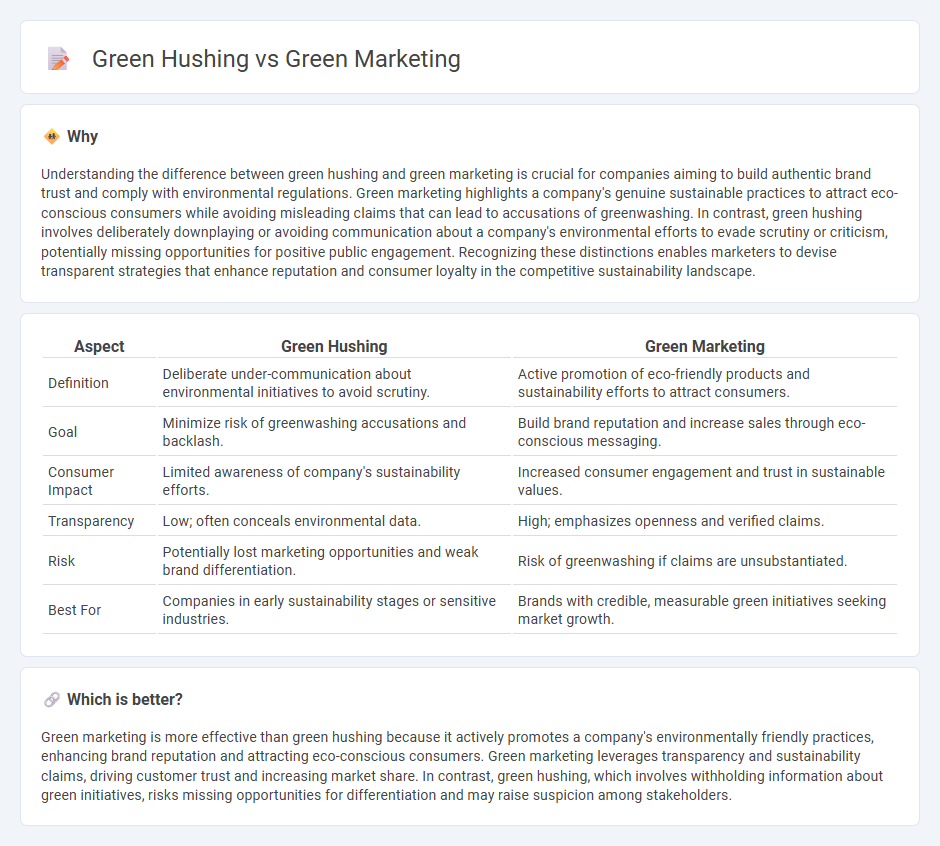
Green marketing emphasizes transparent communication of a company's sustainability efforts to build trust and attract eco-conscious consumers. Green hushing involves deliberately underreporting or concealing environmental initiatives to avoid scrutiny or backlash. Explore the key differences and strategic implications between these approaches.
Why it is important
Understanding the difference between green hushing and green marketing is crucial for companies aiming to build authentic brand trust and comply with environmental regulations. Green marketing highlights a company's genuine sustainable practices to attract eco-conscious consumers while avoiding misleading claims that can lead to accusations of greenwashing. In contrast, green hushing involves deliberately downplaying or avoiding communication about a company's environmental efforts to evade scrutiny or criticism, potentially missing opportunities for positive public engagement. Recognizing these distinctions enables marketers to devise transparent strategies that enhance reputation and consumer loyalty in the competitive sustainability landscape.
Comparison Table
| Aspect | Green Hushing | Green Marketing |
|---|---|---|
| Definition | Deliberate under-communication about environmental initiatives to avoid scrutiny. | Active promotion of eco-friendly products and sustainability efforts to attract consumers. |
| Goal | Minimize risk of greenwashing accusations and backlash. | Build brand reputation and increase sales through eco-conscious messaging. |
| Consumer Impact | Limited awareness of company's sustainability efforts. | Increased consumer engagement and trust in sustainable values. |
| Transparency | Low; often conceals environmental data. | High; emphasizes openness and verified claims. |
| Risk | Potentially lost marketing opportunities and weak brand differentiation. | Risk of greenwashing if claims are unsubstantiated. |
| Best For | Companies in early sustainability stages or sensitive industries. | Brands with credible, measurable green initiatives seeking market growth. |
Which is better?
Green marketing is more effective than green hushing because it actively promotes a company's environmentally friendly practices, enhancing brand reputation and attracting eco-conscious consumers. Green marketing leverages transparency and sustainability claims, driving customer trust and increasing market share. In contrast, green hushing, which involves withholding information about green initiatives, risks missing opportunities for differentiation and may raise suspicion among stakeholders.
Connection
Green hushing and green marketing intersect through corporate environmental communication strategies, where companies either actively promote sustainable practices or deliberately minimize public discussion of their green initiatives. Green marketing leverages eco-friendly messaging to attract environmentally conscious consumers, while green hushing involves withholding or downplaying environmental achievements to avoid scrutiny or accusations of greenwashing. This dynamic reflects the tension between transparency and caution in corporate sustainability branding, influencing consumer perceptions and regulatory responses in the marketing landscape.
Key Terms
Sustainability
Green marketing emphasizes promoting eco-friendly products and sustainable business practices to attract environmentally conscious consumers and enhance brand reputation. In contrast, green hushing refers to companies deliberately downplaying their sustainability efforts to avoid scrutiny, greenwashing accusations, or competitive disadvantages. Explore how navigating the balance between transparency and discretion impacts sustainability strategies in today's market.
Transparency
Green marketing emphasizes transparent communication of a company's sustainable practices and eco-friendly products to build consumer trust and brand loyalty. In contrast, green hushing involves deliberately withholding information about environmental efforts to avoid scrutiny or criticism, potentially undermining transparency and accountability. Discover more about how transparency shapes the success and credibility of green initiatives.
Brand Reputation
Green marketing emphasizes transparent communication of a brand's environmental initiatives to build consumer trust and enhance brand reputation through authenticity and sustainability certification. Green hushing, in contrast, involves deliberately downplaying or concealing environmental efforts to avoid scrutiny or skepticism, which can impact long-term brand credibility. Explore how these strategies influence consumer perception and corporate responsibility by learning more about the balance between transparency and discretion in eco-friendly branding.
Source and External Links
What Is Green Marketing? Definition, Benefits and Strategies - This article explains green marketing as a strategy to promote environmentally friendly products and services, highlighting its benefits and implementation methods.
What Is Green Marketing? Definition and Examples - This webpage provides a definition of green marketing, including examples of companies promoting environmentally friendly products and practices.
Green Marketing: Strategies And Best Examples In 2024 - This resource discusses green marketing strategies, including participation in recycling programs and adoption of sustainable business practices.
 dowidth.com
dowidth.com